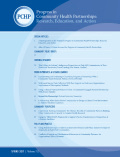
Progress in Community Health Partnerships-Research Education and Action
Scope & Guideline
Transforming Research into Impactful Community Solutions.
Introduction
Aims and Scopes
- Community-Engaged Research:
The journal emphasizes research that actively involves community members in the research process, ensuring that their insights and needs shape the research agenda and outcomes. - Health Equity and Disparities:
A significant focus is on addressing health inequities prevalent in under-resourced and marginalized communities, exploring strategies to mitigate these disparities through partnerships. - Innovative Health Interventions:
The journal publishes studies on novel health interventions developed through community collaboration, showcasing effective practices and methodologies that can be adapted to various contexts. - Education and Capacity Building:
It highlights educational initiatives aimed at building the capacity of both community members and health professionals to engage in research and health promotion. - Multidisciplinary Approaches:
The journal encourages the integration of diverse disciplines in addressing complex health issues, reflecting the multifaceted nature of community health challenges. - Policy Impact and Advocacy:
Research published in the journal often aims to inform policy decisions, advocating for changes that will positively impact community health and well-being.
Trending and Emerging
- Mental Health Interventions:
Recent publications increasingly focus on community-based mental health interventions, particularly in underserved populations, reflecting a growing recognition of mental health as a critical component of overall health. - Digital Health Solutions:
There is a notable rise in research centered around digital health tools and telehealth interventions, especially in response to the COVID-19 pandemic, aiming to improve health access and engagement. - Racial and Ethnic Health Disparities:
The journal is placing greater emphasis on addressing specific health disparities experienced by racial and ethnic minority groups, promoting research that highlights tailored interventions. - Youth Engagement in Health Research:
Emerging themes include the active involvement of youth in community health research, recognizing their unique perspectives and the importance of addressing health issues that affect younger populations. - Sociopolitical Determinants of Health:
Recent studies are increasingly examining how sociopolitical factors, including immigration status and systemic racism, impact health outcomes, advocating for policy changes to address these issues. - Community Resilience and Empowerment:
Research focusing on community resilience, particularly in the context of crises like the COVID-19 pandemic, is becoming more prevalent, emphasizing the importance of empowering communities to address their own health needs.
Declining or Waning
- Traditional Public Health Models:
There appears to be a waning interest in conventional public health models that do not incorporate community engagement. The journal increasingly favors research that emphasizes participatory approaches. - Single-Discipline Research:
Publications that focus solely on single-discipline perspectives are becoming less common. The trend is moving toward interdisciplinary collaborations that incorporate diverse expertise. - Top-Down Health Initiatives:
Research centered on top-down health initiatives, where decisions are made without community input, is decreasing. The journal is prioritizing studies that highlight community-driven solutions. - General Health Awareness Campaigns:
There seems to be a decline in the publication of studies focused on generic health awareness campaigns lacking a community engagement component. The emphasis is shifting towards targeted interventions developed with community input. - Quantitative-Only Studies:
The journal is seeing fewer publications that rely solely on quantitative methodologies. There is a growing preference for mixed-method approaches that include qualitative insights from community members.
Similar Journals
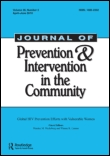
Journal of Prevention & Intervention in the Community
Advancing community health through innovative interventions.The Journal of Prevention & Intervention in the Community, published by ROUTLEDGE JOURNALS, TAYLOR & FRANCIS LTD, is an influential platform devoted to advancing knowledge in the fields of community health and social psychology. With a respectable impact factor and ranking in the Q3 quartile for both Medicine (miscellaneous) and Social Psychology, this journal occupies a crucial space for researchers, practitioners, and students seeking to explore the intersections of health prevention strategies and community interventions. Since its inception in 1996, it has provided a forum for innovative research, practical applications, and critical discussions, contributing to the evidence base necessary for effective community initiatives. While currently not available in an open access format, the journal remains committed to high-quality scholarly work and nurtures the dissemination of impactful findings across disciplines. Situated in the United States and catering to a global audience, the Journal of Prevention & Intervention in the Community continues to be an essential resource for those dedicated to enhancing community well-being.

JOURNAL OF COMMUNITY HEALTH
Elevating public health discourse and action.JOURNAL OF COMMUNITY HEALTH, published by SPRINGER, stands as a premier source of scholarly information in the fields of community health, public health, environmental, and occupational health. With an impressive impact factor and ranked in the top quartiles (Q1) across related categories, this journal positions itself as a critical resource for researchers, professionals, and students dedicated to advancing the well-being of communities. Since its inception in 1975, it has tackled vital issues affecting public health systems and policies, providing a platform for innovative research and critical analyses. The journal's high Scopus rankings reflect its commitment to quality and academic excellence, being ranked #12 in Social Sciences - Health and #36 in Medicine - Public Health. Subscribers can benefit from comprehensive reviews and empirical studies, while authors are invited to contribute to a growing body of knowledge that shapes health practices globally. With a clear focus on real-world impact and community engagement, JOURNAL OF COMMUNITY HEALTH continues to play a fundamental role in informing public health strategies and interventions.
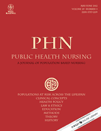
PUBLIC HEALTH NURSING
Advancing public health through innovative nursing practices.PUBLIC HEALTH NURSING is a premier journal published by Wiley, dedicated to advancing the field of public health nursing through the dissemination of high-quality research and innovative practices. With an ISSN of 0737-1209 and an E-ISSN of 1525-1446, this journal provides a vibrant platform for scholars and practitioners to share their insights from 1945 to the present day. The journal holds a strong presence in academia, ranked in Q1 within the Nursing (miscellaneous) category and Q2 in Public Health, Environmental, and Occupational Health for 2023, showcasing its commitment to impactful research. Currently positioned at rank #39 in General Nursing and #286 in Public Health according to Scopus, it serves as an essential resource for healthcare professionals, researchers, and students who are passionate about improving health outcomes and community well-being. Although it does not offer Open Access, PUBLIC HEALTH NURSING remains a significant contributor to the literature, promoting interdisciplinary collaboration and addressing critical public health challenges.
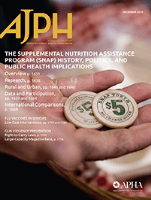
AMERICAN JOURNAL OF PUBLIC HEALTH
Innovating solutions for community health challenges.The American Journal of Public Health, published by the American Public Health Association, stands as a cornerstone in the field of public health and epidemiology since its inception in 1949. With its rigorous peer-review process and a robust commitment to advancing knowledge and research practices, this journal holds a prestigious position in the academic community, as reflected in its 2023 Scopus ranking, where it is placed in the top percentile (93rd) within the categories of Public Health and Environmental and Occupational Health. The journal's focus encompasses a broad spectrum of public health topics, making it essential reading for researchers, practitioners, and students dedicated to improving population health. Subscribers can access invaluable insights through its collection of innovative studies and reviews, thereby reinforcing the journal's role in shaping public health policy and practice. By bridging research and real-world application, the American Journal of Public Health remains a vital resource for those engaged in the quest to improve health outcomes across diverse communities.
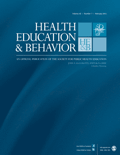
HEALTH EDUCATION & BEHAVIOR
Exploring Evidence-Based Practices for Healthier Communities.HEALTH EDUCATION & BEHAVIOR is a premier journal published by SAGE Publications Inc, dedicated to advancing the fields of health education and behavioral science. Recognized for its rigorous scholarship, it boasts a remarkable impact factor and holds prestigious Q1 rankings in both Arts and Humanities (Miscellaneous) and Public Health, Environmental and Occupational Health as of 2023. With converged publication years spanning from 1957 to 2024, this journal serves as a vital platform for researchers, professionals, and students to disseminate innovative findings and explore evidence-based practices that foster health awareness and behavioral change. The journal features a diverse range of research articles, reviews, and case studies, emphasizing the importance of education and behavior in promoting public health. Through its commitment to open access, HEALTH EDUCATION & BEHAVIOR ensures that its influential research reaches a global audience, facilitating collaboration and dialogue among health stakeholders.
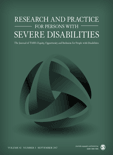
RESEARCH AND PRACTICE FOR PERSONS WITH SEVERE DISABILITIES
Bridging research and practice to enhance community engagement.RESEARCH AND PRACTICE FOR PERSONS WITH SEVERE DISABILITIES, published by SAGE Publications Inc, is a premier academic journal dedicated to advancing the understanding and enhancement of quality of life for individuals with severe disabilities. Since its inception in 1975, it has provided a critical platform for groundbreaking research and innovative practices within the fields of health professions, public health, and social psychology. With a commendable impact factor and a recognition of being placed in the Q1 quartile for Health Professions and Q2 for both Public Health and Social Psychology, this journal is a vital resource for researchers, clinicians, and policymakers alike. The journal not only disseminates scholarly articles that explore evidence-based interventions but also emphasizes the importance of community engagement and policy advocacy. By fostering a multidisciplinary dialogue, it aims to inform best practices and promote inclusivity for persons with severe disabilities. Access to the journal's rich archives and contemporary articles is streamlined, making it an indispensable tool in the scholarly community. For further information and to explore current research, visit the journal's page on the SAGE Publications website.

Journal of Multidisciplinary Healthcare
Exploring innovative solutions for contemporary healthcare challenges.The Journal of Multidisciplinary Healthcare, published by DOVE MEDICAL PRESS LTD, is a premier open-access journal dedicated to the interdisciplinary landscape of healthcare research. Established in 2008, this journal has quickly gained recognition, boasting a Q2 ranking in Medicine (miscellaneous) and an impressive Q1 ranking in Nursing (miscellaneous) as of 2023. With a Scopus rank of #21 out of 139 in General Nursing and positioned in the 85th percentile, it serves as a vital platform for disseminating high-quality research that bridges the gap between various healthcare disciplines. Its commitment to open access ensures that innovative research is readily available to practitioners, researchers, and students, facilitating knowledge exchange and fostering collaboration within the global healthcare community. The journal welcomes submissions that address contemporary challenges in healthcare, making it an essential resource for those seeking to advance their understanding and practice in this vital field.

Human Resources for Health
Connecting policy and practice for a healthier tomorrow.Human Resources for Health, published by BMC, stands as a premier open-access journal dedicated to the vital intersection of human resources and health systems. With an impressive history since 2003, this journal has become a significant contributor to the fields of Public Administration and Public Health, earning a distinguished position in the top quartile rankings (Q1) of both categories in 2023. With a focus on advancing the understanding of workforce management and health policy, it serves as a critical platform for researchers, practitioners, and policymakers committed to enhancing health systems globally. The journal's notable impact is reflected in its Scopus rankings, where it is placed in the 92nd percentile for Public Administration and the 90th percentile for Public Health, underscoring its relevance and influence in contemporary discourse. The open-access model facilitates widespread dissemination of knowledge, ensuring that cutting-edge research is accessible to a diverse audience. As we move towards 2024, Human Resources for Health continues to strive for excellence, offering a wealth of knowledge that is essential for shaping the future of healthcare delivery and workforce development.
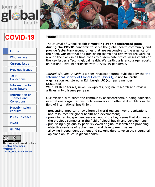
Journal of Global Health
Driving interdisciplinary collaboration for a healthier world.The Journal of Global Health, published by the International Society for Global Health, is a premier open-access journal that has been advancing the field of global health since its inception in 2011. With ISSN 2047-2978 and E-ISSN 2047-2986, this notable journal resides in the United Kingdom and serves as a vital platform for disseminating cutting-edge research and innovative practices in health policy and public health. Recognized for its impact, it holds a prestigious Q1 ranking in both Health Policy and Public Health, Environmental and Occupational Health as of 2023, and boasts impressive Scopus rankings, positioning it among the top journals in its categories. The journal's commitment to open access promotes widespread dissemination of knowledge, making vital research accessible to practitioners, policymakers, and scholars worldwide. With a keen focus on global health challenges, the Journal of Global Health aims to foster interdisciplinary collaboration and contribute to the development of effective strategies that enhance health equity and sustainable health systems across various populations.
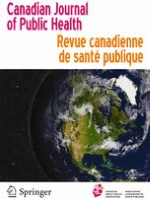
CANADIAN JOURNAL OF PUBLIC HEALTH-REVUE CANADIENNE DE SANTE PUBLIQUE
Elevating standards in public and environmental health research.The Canadian Journal of Public Health - Revue Canadienne de Santé Publique, published by Springer International Publishing AG, stands as a pivotal platform for scholarly discourse in the fields of public health and environmental health. With its esteemed position in the Q1 category for both Medicine (miscellaneous) and Public Health, the journal boasts an impressive Scopus ranking that places it within the 80th percentile, reflecting its contribution to advancing knowledge and best practices in public health since its inception in 1945. Situated in Switzerland, this journal serves a global audience of researchers, professionals, and students dedicated to improving public health outcomes. Although it offers traditional access options, its rigorous peer-review process ensures that high-quality research remains at the forefront of its publications. Whether addressing emerging health issues or environmental challenges, the journal plays a vital role in shaping the conversation and policies that influence health systems worldwide.